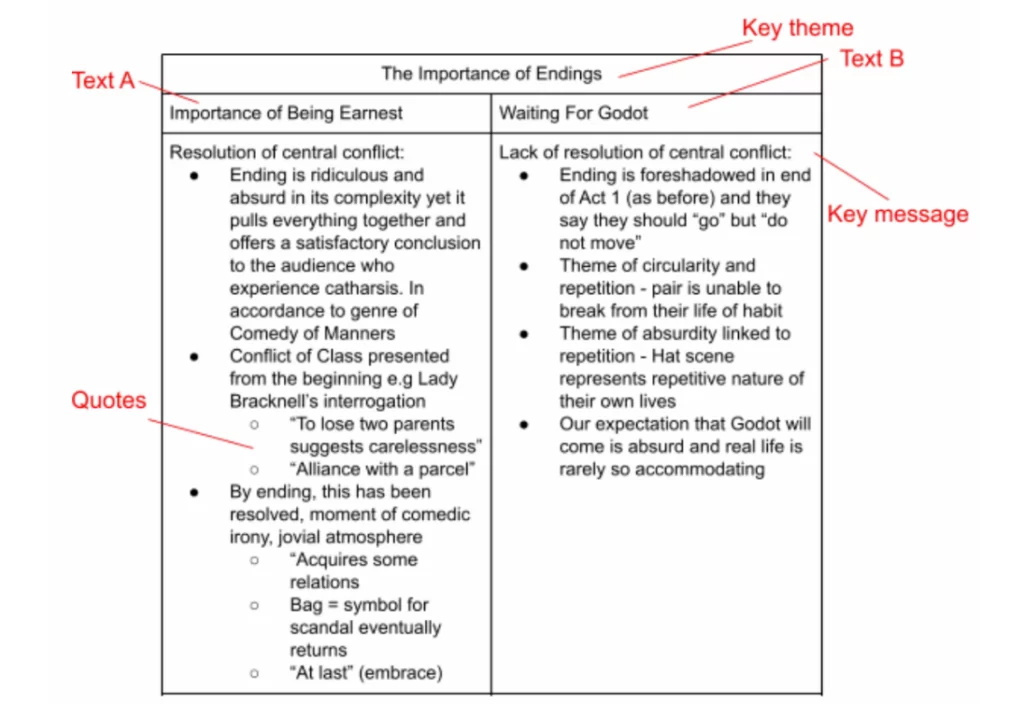
Paper 2 is back! That’s right, we all have tackle this beast in May 2023, so it’s time to master the basics about comparative literary analysis. Remember that this task demands attention to authorial choices and how they shape meaning. So, when reading your literary works, pay attention to the moves the writer makes to communicate important ideas.

Part of our IBDP English A Student Toolkit , The Complete Study Guide for Paper 1 and Paper 2 includes:
- 250+ pages of updated review material!
- The best of our website videos and documents
- NEW content not available on our website
- 20 highlighted papers with examiner notes
- Discussion videos justifying marks on sample papers
- Full assortment of graphic organizers
- Sentence stems and guidance for analysis

Paper 2 Exam Review Video Course
Looking for more detailed instruction? Our Paper 2 Exam Review course leverages two short stories and guides you step-by-step through the writing process in 10 videos. In the end, you will have written a strong sample response for your selected texts. This course is for dedicated students looking to do the hard work necessary to improve their Paper 2 skills.

Part of our IBDP English A Student Toolkit , this resource includes:
- Step-by-step approach to building the Paper 2 response
- 10 asynchronous lessons and 2 hours of NEW video
- Two short stories with completed graphic organizers to model the entire Paper 2 writing process
- Blank graphic organizers to use with your Paper 2 texts
- Guidance on using generative AI for Paper 2 revision
Free Study Sessions - May 2024 Exam Prep!
We know students are gearing up for exams, and we’re eager to help. Join us for a FREE Study Session!
Each study session will last approximately 2 hours and review the key concepts needed for success on exam day. Please visit the Revision Village Study Session page for timezones and register now!
Paper 2 From Start to Finish
In this 9-video series, we’ll show you the entire process from start to finish. We’ll use two short stories as our model and follow the “we go, you go” protocol. We’ll show you the steps with our sample stories, and then encourage you to do the same steps with your chosen Paper 2 texts. In the end, you will have written an entire sample paper under our guidance. So, be sure to download and complete all the graphic organizers. Stay with us. Follow the models. Do like we do. Paper 2 success is within reach!
Unpacking the Paper 2 Task
- Document: Nuts and Bolts
- READING: Two Short Stories
Breaking Down Text 1
Document: 1-Text Organizer – TEXT 1
Breaking Down Text 2
Document: 1-Text Organizer – TEXT 2
Comparing Texts 1 and 2
Document: Comparative Organizer
Writing the Outline and Thesis
Document: Getting ready to write
Writing the Introduction:
Document: Writing the Intro
Writing Body Paragraphs.
Document: Body Paragraphs
Writing the Conclusion
Document: Paper 2 Conclusions
Scoring the Sample Paper 2
Document: Examiner Scoring
Paper 2 - Breaking Down the Skills
Sure, we understand that you want to see sample papers and examiner comments. Those are coming. However, none of those support materials matter unless you know the basics of Paper 2. Watching the videos and reading the accompanying documents will put you in an excellent position to showcase your best comparative writing on assessment day. Once you have mastered, these skills, then it’s time to move on to practice papers.
Meet the assessment and understand how to achieve success on Paper Two.
Paper 2 Details and Tips
Learn how to break down the question and get stay focused.
Document: Breaking Down the Question
Don’t forget to brainstorm and mind map!
Document: Brainstorming and mindmapping
The thesis is important…watch this video!
Document: Writing the Thesis
Block style or alternating style? Watch this video to find out.
Document: Structuring the Response
How can I get off to a strong start in this paper? We’ve got the answer.
It’s critical to write strong comparative body paragraphs. Watch this!
Mr. Giles always says to “end strong.” Watch this video and find out how!
Document: Writing Conclusions
Paper 2 - Refining Our Skills
Now that you’ve seen the entire process from beginning to end, let’s combine some of these ideas and refine our understanding of the key skills needed to master this assessment.
How can we quickly understand the question, brainstorm ideas, and get to the thesis?
Document: From Question to Thesis
Still stuck with that introduction? Here is some more support. Watch and nail this important step!
Document: Introduction 2.0
The more body paragraphs we read, the better we get at this difficult task. Watch the video!
Document: Comparative Body Paragraphs
Once you have all the skills in place, it’s time to make sure you understand all the key tips and details of this important assessment. Looking at student and teacher models is also helpful, and we will continue to populate this section as the year progresses.
In this video, notice how the student approaches the work, maintains focus, and shows complete command of references, features, and the language of the question.
Document: Paper Two - Student Sample
This video presents 10 important tips students should remember when getting ready to write Paper 2.
Document: Paper Two - Top Ten Tips
This video shows students how to formulate their own sample questions. Give it a try!
Document: Spitballing Paper 2
Watch this video right before exams. Don't miss this checklist!
Document: Paper 2 Checklist
IB English Guys
Newsletter signup.
IB English Paper Two – Everything You Need to Know To Ace the Exam

Written by Jay ayliffe
When it comes to Paper 2 for IB English Lit/Lang and Lit, there are several things that students often find challenging. Some common reactions to seeing a Paper 2 for the first time include:
- ‘The questions don’t make any sense!’
- ‘It’s too broad – I don’t know what they want me to say’
- ‘There’s no way I’m going to be able to remember the right quotes for that!’
Now, these are understandable reactions! Paper 2 can seem a little wacky and abstract, especially after the more relatively straightforward Paper 1 exam. However, if you take the time to unpack what the IB is looking for and follow the tips below, you’ll find that Paper 2 isn’t that bad. With the right preparation, it can be pretty straightforward, after all!
what is the English Paper 2 Exam?
In a nutshell, the IB asks you to write a comparative essay in response to a prompt.
Over the course of the year, whether you are a Lit or a Lang/Lit Student, you will have studied a series of texts. These may be poems, novels, plays or short stories. The Paper 2 exam allows you to draw upon these texts, using them to explore similarities and differences in relation to the central theme of the prompt. For instance,
“Not rounding off, but opening out.” Comment upon the way writers deal with the ending. In your answer, you should refer to two or three texts you have studied.”
Or how about?
Writers utilise a number of different devices within their works, including using time jumps or other non-linear structures. Considering two texts, discuss how writers use structural elements in unusual or interesting ways to shape meaning.”
Okay, these questions may seem a little mean at first, but you only have to answer one question! You will have 1.5 hours if you are a Standard Level (SL) student and 2 hours if you are an English Lit/Lang Higher Level (HL) student! (If you want some more help breaking down the question, check out this helpful blog on command terms )
The key thing to do here is to provide a structured and detailed answer that offers a balanced and meaningful discussion of both texts. Ideally, this means you are identifying 2-3 points of insight from the central questions relevant to both texts. This allows you to write 4-6 chunky paragraph s in answer to the question, in addition to the MANDATORY introduction and conclusion.
What do I need to do to prepare for the Paper 2 Exam?
First of all, planning is essential ! You will not know which questions the IB will ask you before opening your exam. However, a quick look over papers from previous years will tell you about the common themes and techniques the IB loves to ask about. Broadly, you can categorise these questions into three groups:
Why you should learn more than 2 works
Now, you have a rough idea of what they could ask you. Next, you should go back to your set of texts. Determine which combination of works would work best for you if you had to answer one of these questions.
Some students commit to just learning two works. They rely on their in-depth knowledge of these texts to answer any question that may come up. I understand their approach, but I think having at least two possible combinations of texts available is best (e.g. Text A+B, A+C, or B+C). This ensures you are best prepared to answer questions with reference to the most relevant works.
Also, you certainly don’t want to be stuck giving yourself more to do by exaggerating the importance of one theme/technique in a work because that’s the only one you know!
With these choices made, you can start compiling quotes, context and moments from the texts, which you can use as evidence. Aim for 4-5 really good points of information that you can expand upon in your essay. Even better, if you already know that, you can directly compare/contrast it with a quote/technique from the other piece of work.
For instance, with my Paper 2 exam, I found it helpful to organise my notes in the following layout:

As you can see, I have prepared a mixture of quotations and techniques that I could draw upon for this question on endings. It also allows me plenty of room to elaborate on individual points when I develop new ideas and connections.
Practising Paper 2 Questions
Practising exam questions will help you feel confident writing Paper 2s. Through practice, you will also learn to adapt your prepared notes to specific prompts.
However, before getting stuck in, spend a bit of time thinking about your introductions. An excellent introduction will outline everything you want to cover in your essay, which is key to ensuring you are heading in the right direction. Have a look at the one below and think about all the different criteria it is attempting to reach:
As in all art forms, the ending of a play usually serves to resolve its central conflict, to highlight character development and to convey to the audience a final, lasting message which summarises the major themes and motifs previously seen in the performance. Wilde’s’ Importance of Being Earnest (Importance) appears to display all of these conventions as by the end of the play, the central protagonist, Jack emerges triumphant. However, theatre, as a highly versatile and varied art form, can and has been used to explore radical modernist and postmodernist approaches to art such as in Samuel Beckett’s play Waiting for Godot where these traditional conventions of an ending are questioned. Indeed, while Wilde’s play follows the traditional conventions of an ending in theatre almost to the point of comedic lunacy, Beckett’s play seeks to completely dismiss them . This is undoubtedly the result of the two theatrical productions differing purposes and cultural contexts where Importance clearly belongs to the theatrical genre of comedy of manners while Waiting for Godot is part of the theatre of the absurd. Yet despite these radically different approaches, both highlight the importance of endings as a tool for a playwright to reiterate their main message and to provide the audience with a particular impression to take away. Sample Paper 2 Introduction by Jay
Criterion A: Knowledge, Understanding and Interpretation
- A clear statement about the writer’s choices and the effects of literary devices. It also sets up the basic structure of the essay to cover three core elements: conflict resolutions, character development and lasting message.
Criterion B: Analysis and Evaluation
- Unambiguous comparative statements about how and why the two texts differ regarding their endings, as well as share similarities.
Criterion C: Focus and Organisation
- The student introduces two key texts and their authors. There is a balanced description of both works, which the student will continue in the main body.
Criterion D: Language
- Spelling, punctuation and grammar is consistently accurate. The student uses a range of vocabulary and relevant, literary/text-specific terminology with precision.
Try to build a habit of writing essay plans with a short introduction. Doing this will help you to turn your notes and ideas into written answers more easily. It will also be an excellent resource for future exam prep! (Also, if you need help putting in the time for revision, these apps can be really helpful!)
6 Final Tips
Here are 6 final top tips to keep in mind next time you head into your Paper 2 English Exam!
- Develop Strong Time Management: Time management is crucial during the exam. Allocate a specific amount of time for planning (no more than 20 minutes) and stick to it. Make sure you give yourself enough time to talk about both works in a balanced way.
- Annotate The Question: Highlight key phrases and jot down initial thoughts. These annotations will ensure that you are sticking to the question and mean you won’t have to start with a blank page!
- Develop a Strong Thesis: In the comparative essay, a well-crafted thesis is essential (Click here to learn more about writing a brilliant thesis ). Clearly state your argument and how you will be referring to both texts in your answer. This will guide your essay and keep it focused.
- Compare Throughout: Every paragraph should start with a comparative, e.g. Both texts explore the theme of loneliness or Unlike text A, Text B utilises its setting to highlight . These topic sentences set you up to dig deeper and explore how these different writers’ choices contribute to the overall meaning and message of the texts.
- Incorporate Literary Devices: Demonstrate your knowledge of literary devices by incorporating them into your analysis. Discuss how these devices enhance the texts and support your arguments.
- Proofread and Revise: Allocate some time at the end of the exam to proofread your essays. Check for grammar, spelling, and clarity. Ensure that your ideas flow smoothly and coherently.
Final Thoughts
I hope this all helps! Remember to prepare for the prompts, test your introductions and focus on critical analysis. If you follow these tips and dedicate yourself to practise, you’ll be in the best possible position to go and ace the English Paper 2 Exam! However, if you want extra assistance and guidance, please check Lanterna’s Online Private Tutoring service . Our tutors can sit down with you 1-on-1 online and help you plan, improve and offer feedback on your Paper 2 exams.
Preparing for your IGCSE?
When preparing for IGCSE , students often seek effective strategies to enhance their chances of success. Exploring different study techniques is crucial. For instance, integrating mind mapping into your revision routine can significantly improve information retention. Additionally, consider joining or forming a study group. Collaborating with peers not only fosters a supportive learning environment but also allows for the exchange of diverse perspectives. Another valuable approach is to leverage online resources, such as educational websites and forums like Lanterna. These platforms provide access to supplementary materials and can help reinforce key concepts. By adopting these varied methods, students can tailor their preparation to suit their learning styles, setting a solid foundation for IGCSE success.
Share article links
Related Articles

- Plan for Success
- Revision Skills
- Study Skills
Top Tips for Studying Global Politics
Develop Passive Sources of Glo Po Income! Although this sounds like a Youtube advertisement for attaining financial FREEDOM by developing these TOP 10 passive income streams, I promise this is not a pyramid scheme but an excellent way to prepare for Glo Po on your way to school! You can think of your Glo Po […]
- IB - Understanding It
Finn’s Study Tips – How to Improve Languages
This week we’re hearing from Finn, one of our school presenters, about how to improve your languages. Check out Finn’s study tips below! How to Improve Languages Languages are a huge part of the IB, with both Studies in Language and Literature and Language Acquisition being compulsory areas of study. For some students, this is […]

- Student Self Care
Coping With Exam Stress (Exam Blackout)
Exam stress sucks. Excuse the bluntness, but as I tested different openers, no words rang as true as those. It sucks. Coping with it starts before you even feel it. However, before we get into all that, allow me to paint a picture to remind you just how bad it can be. You’re sitting at […]
IB English/Paper II
Return to IB English
- 1.1 How Many Works Should I Write About?
- 1.2 Duration of Exam
- 1.3 Length of Essay
- 2.1 Marking
Introduction [ edit | edit source ]
Paper 2 is the second part of the written examination for candidates taking the IB English A1 course. Using the Part 3 works the candidates have studied throughout the year, the candidates are required to write an essay based on a selection of prompts.
The time given to write the essay is 2 hours for Higher Level candidates and 1 hour, 30 minutes for Standard Level candidates.
The test itself is split into five categories:
- Prose: The Novel and Short Story
- Prose: Other than the Novel and Short Story
- General Questions on Literature
Each heading contains two questions, with the exception of the General Questions section which has four. For the most part, each prompt elicits a general response. However, the broad question base is deceiving, as writing a general response will not garner you that esteemed 7. Your best bet is to focus on providing as detailed a response as possible. The following are suggestions only:
- Acquaint yourself with the key motifs, themes, symbols, and literary elements of the works you study
- Utilize direct quotations from the text. (While you are not required to do so, it will show your dedication and complete understanding of the text, especially if the quotes are used as pillars for your arguments.)
- Obtain viewpoints from professional sources during the school year, and refer to their research in your own paper. (Ex. Look up Dr. Mark Breitenberg, who writes on Macbeth)
How Many Works Should I Write About? [ edit | edit source ]
The paper requires the candidate to write on at least two works of literature (from two different authors) that have been studied, but it is not recommended to write about more than three, as the scope is too broad to incorporate a detailed discussion.
Also, the questions are intended to ensure that no "canned essay" can be used, that is, an essay a candidate has memorized before hand to fit the themes of essay. So, if you were planning on using this, you're out of luck.
Duration of Exam [ edit | edit source ]
The IB English Paper 2, (more formally known as English Language A1 Paper 2), is written in a 2 hour timeframe for HL (Higher Level) and in 90 minutes for SL (Standard Level). The questions on the test are broad and generalized (see above), and require you to use the novelists you have studied in your IB English course, or the texts in your "Prescribed Titles", that your school has selected. The questions often employ a generalized quotation, and then ask that you analyze your texts based on the themes presented in the quotation.
Length of Essay [ edit | edit source ]
Remember: Quality over Quantity. A short, concise and to-the-point essay will score higher than a long, rambling one which repeats itself.
The length of the essay should probably be around 1000 words by the end of the examination, and for a question such as the ones below, it is recommended to juxtapose at least 2 novels against each other, and examine this claim.
Examples of Typical Questions on The Paper [ edit | edit source ]
- “Often enough the novelist favors certain characters, even waxing sentimental about them, and becomes annoyed with others, even feeling contemptuous of them: one way or another, the reader detects bias in the portrayal of the society. How far have you found your chosen novelists to be biased or unbiased in their presentation of their characters and what has been the resulting effect in each novel?"
- "Authors favor certain characters, often portraying them in positive light, wherein others are portrayed contemptuously. How far have you found this to be true with your chosen novelists?"
- Compare and contrast the authors' use of dreams, hopes or aspirations in two or three novels and/or short stories you have studied.
How would you answer the above? If you have time, try a mock final on your own, if your school doesn't already have them set up for you.
Marking [ edit | edit source ]
The examination is externally moderated, and is timed.
Results typically come out 2-3 months after your exams, often the date falls near July 5th for May testing and around January 5th for the November session.
- Book:IB English
Navigation menu

What is the best way to prepare for IB English Paper 2?
Table of Contents
- 1 English Paper 2
- 2 Grade Weightage
- 3 Example guiding questions from the 2018 exam:
- 4 Example preparation schedule
The comparative literary essay
Every IB student has to write Paper 2. It doesn’t matter whether they choose Language & Literature, or Literature, SL or HL. Since 2021, even the questions and marking guides are the same.
Related article: Differences Between IB Literature and Language & Literature
English Paper 2
- A comparative analysis of two works studied
- Choose from four general questions
- 1 hour 45 minutes
Grade Weightage
- Language & Literature SL, 35%
- Language & Literature HL, 25%
- Literature SL, 35%
- Literature HL, 25%
At least 3 months before the exam, students should revise several works to be ready for Paper 2. The IB suggests preparing three works. Some works will be more flexible than others, and some students in the past have aced this paper by preparing just two works. Of course, it is better to prepare 2 works in a responsible way than 3 works in a sloppy way. If a student is trying to decide how much to prepare, they should look at Paper 2 questions from past exams and make sure that their chosen works are flexible enough to answer any of the guiding questions.
Example guiding questions from the 2018 exam:
- How do the two works you have studied show that good can come out of destruction or violence?
- How and to what effect are strangers or strangeness represented in the two works you have studied?
- Discuss how one or more of the formal characteristics of a genre influence meaning in the two works you have studied.
Conventional advice is that students should annotate their works to prepare for Paper 2. But how do you annotate a work for Paper 2 and annotate it well? The most common problem is annotating too much. When students are worried about finding material for every kind of question, they start highlighting anything that could be even a little relevant, and their annotations become cluttered. A struggling student might create a “key” that looks like this:
When a student looks at these cluttered pages, it will be impossible to tell what is really important. They may not even remember why they highlighted a sentence. Instead, students should choose a few open-ended questions which actually interest them.
Using simple questions like “Which characters demonstrate courage?” or “Who feels guilty?” may seem like poor preparation for specific IB questions. But students are unlikely to guess what the IBO is thinking anyway. In a proper annotation of a work, the same few scenes and quotes will always stand out. When a student does this, they will also start to understand how the parts of the work relate to the whole, because questions like “Which characters demonstrate courage” require the student to carefully read every part of the book looking for the best evidence.

Example preparation schedule
4 Months before: Choose three works to annotate carefully and thoroughly 2 Months before: Practice writing Paper 2 1 Month before: Review and improve annotations
Students should be able to reread a book in 12 hours, depending on the length of the book. They should also spend time thinking about several thematically focused questions and analyse parts of the book that are relevant to the chosen focus areas. Ideally, students will finish annotating their works two months before the exam. In the last two months, students should practice several examples of paper 2. Every practice paper should be strictly timed for 1 hour and 45 minutes. When a student doesn’t have time to write a full practice paper, they can practice for the topic by writing a short outline that includes all the evidence they might use.
Students usually find that they need to go back into their works to revise their annotations and investigate some additional questions. This is normal, and also a reason why responsible students should start preparing for paper 2 early.
Trial Class Registration
Need help with the IB? Prep Zone Academy provides one-to-one tuition in a wide range of subjects at both the SL and HL levels. Our team of all-star trainers offers undivided attention throughout these sessions in addition to a fully personalized curriculum that is specifically tailored to meet your personal goals. Our trainers will work closely with you to help you achieve your goals, whether you wish to work on specific weaknesses or prepare for the upcoming assessment.
Additionally, parents will receive personalized feedback after every lesson, so they are always informed of what is being taught in class. Sign up for a trial lesson today to experience the Prep Zone’s difference!
For any urgent inquiries, contact us at +65 6812 9999 or Whatsapp us at +65 8305 1871
By submitting this form, I agree to Prep Zone Academy’s Privacy Policy and Terms of Use .
Popular Posts
- IB vs A Level – What’s the difference? March 18, 2021
- All You Need To Know About IB’s Theory Of Knowledge (TOK) February 4, 2021
- 4 Top Tips To Best Prepare For IB Literature April 13, 2021
- How To Prepare For TOK June 24, 2021
- What makes a good TOK Exhibition? August 4, 2021
Latest Posts

Author Prep Zone Academy
Join the discussion one comment.
- Pingback: 4 Top Tips To Best Prepare For IB Literature
© 2022 Prep Zone Academy
Privacy Policy & Terms of Use
This site is protected by reCAPTCHA and the Google Privacy Policy and Terms of Service apply.
Prep Zone Academy is an MOE Registered Private School (200615000Z)
Office Hotline: +65 6812 9999 Email : [email protected]
Orchard Campus
15 Scotts Road, #07-05 Singapore 228218 Open daily | 10:00AM - 6:00PM Closed on weekday public holidays

Prep Zone Academy® has adopted the Tripartite Standard on Flexible Work Arrangements, and has committed to be a fair and progressive employer.
© 2024 Prep Zone Academy | IB Tuition. All Rights Reserved
- IB Math Tuition
- IB English Tuition
- IB Physics Tuition
- IB Chemistry Tuition
- IB Biology Tuition
- IB Economics Tuition
- IB Psychology Tuition
- IB Score Guide
- Theory of Knowledge
- English Language & Literature
Sample exam papers
The following are examples of actual past examination papers, and a selection of specimen examination papers. They are provided for information only.
Join the IB's global alumni network
The IB is extremely proud of its graduates, and the alumni network connects them with one another and with the IB community.
Members of the alumni network receive opportunities to get involved in IB projects and to share their stories.
Students who will graduate in the next two years are encouraged to join.
- Join the network


We use cookies on this site. By continuing to use this website, you consent to our use of these cookies. Read more about cookies
IBDP English A: Language & Literature
Website by David McIntyre & Tim Pruzinsky
Updated 28 March 2024
InThinking Subject Sites
Subscription websites for IB teachers & their classes
Find out more
- www.thinkib.net
- IBDP Biology
- IBDP Business Management
- IBDP Chemistry
- IBDP Economics
- IBDP English A Literature
- IBDP English B
- IBDP Environmental Systems & Societies
- IBDP French B
- IBDP Geography
- IBDP German A: Language & Literature
- IBDP History
- IBDP Maths: Analysis & Approaches
- IBDP Maths: Applications & Interpretation
- IBDP Physics
- IBDP Psychology
- IBDP Spanish A
- IBDP Spanish Ab Initio
- IBDP Spanish B
- IBDP Visual Arts
- IBMYP English Language & Literature
- IBMYP Resources
- IBMYP Spanish Language Acquisition
- IB Career-related Programme
- IB School Leadership
Disclaimer : InThinking subject sites are neither endorsed by nor connected with the International Baccalaureate Organisation.
InThinking Subject Sites for IB Teachers and their Classes
Supporting ib educators.
- Comprehensive help & advice on teaching the IB diploma.
- Written by experts with vast subject knowledge.
- Innovative ideas on ATL & pedagogy.
- Detailed guidance on all aspects of assessment.
Developing great materials
- More than 14 million words across 24 sites.
- Masses of ready-to-go resources for the classroom.
- Dynamic links to current affairs & real world issues.
- Updates every week 52 weeks a year.
Integrating student access
- Give your students direct access to relevant site pages.
- Single student login for all of your school’s subscriptions.
- Create reading, writing, discussion, and quiz tasks.
- Monitor student progress & collate in online gradebook.
Meeting schools' needs
- Global reach with more than 200,000 users worldwide.
- Use our materials to create compelling unit plans.
- Save time & effort which you can reinvest elsewhere.
- Consistently good feedback from subscribers.
For information about pricing, click here
Download brochure
See what users are saying about our Subject Sites:
Find out more about our Student Access feature:
- Organizing and Structuring Paper 2
- Resources for Students
There is no formula for writing a Paper 2. Instead, there are many right ways to write it. It’s also important to note that different English-speaking cultures may have slightly different approaches to writing. The IB honors them all. This following worksheet is just a guide. You may write more. You may write less. This is only meant to give you an idea of what you may choose to do in terms of organizing your Paper...
To access the entire contents of this site, you need to log in or subscribe to it.
Alternatively, you can request a one month free trial .

Choose Your Test
Sat / act prep online guides and tips, the best ib english study guide and notes for sl/hl.
International Baccalaureate (IB)

Are you taking IB English and need some help with your studying? No need to reread all the books and poems you covered in class! This study guide is for IB English A students (students in IB English A: literature SL/HL, IB English A: language and literature SL/HL, or IB English literature and performance SL ) who are looking for additional guidance on writing their commentaries or essays.
I've compiled this IB English study guide using the best free materials available for this class. Use it to supplement your classwork and help you prepare for exams throughout the school year.
What's Tested on the IB English Exams?
The IB English courses are unique from other IB classes in that they don't have a very rigid curriculum with exact topics to cover. Instead, your class (or most likely your teacher) is given the freedom to choose what works (from a list of prescribed authors and a list of prescribed literature in translation from IBO) to teach. The exams reflect that freedom.
On the exam for all English A courses, you're asked to write essays that incorporate examples from novels, poems, plays, and other texts you've read. You're also asked to interpret a text that you've read for the first time the day of the exam.
The exact number of questions you'll have to answer varies by the course , but the types of questions asked on each all fall into the two categories listed above.

What's Offered in This Guide?
In this guide, I have compiled materials to help teach you how to interpret poetry and how to structure your essay/commentary. I've also provided notes on several books typically taught in IB English SL/HL.
This should be most of the material you need to study for your IB exam and to study for your in-class exams.
How to Interpret Poetry Guides
Many people struggle the most with the poetry material, and if you're one of those people, we have some resources specifically for making poetry questions easier.
Here is a full explanation of how to interpret poetry for the IB exam with term definitions, descriptions of types of poems, and examples. We also have tons of poetry resources on our blog that range from explaining specific terms all the way to complete, expert analyses of poems you should know.
Here are some resources to get you started:
- Imagery defined
- Everything you need to know about Point of View
- The 20 poetic devices you should know
- Understanding allusion
- A crash course on Romantic poetry
- Understanding personification
- Famous sonnets, explained
- An expert guide to understanding rhyme and meter, including iambic pentameter
- The eight types of sonnets
- Expert analysis of "Do not go gentle into that good night" by Dylan Thomas
This is another great resource with poetry terms defined on "flashcards" , and you can test yourself on the site by clicking "play."
How to Write Your Essay Guide
If you're not sure how to write your essay, here's a guide to what your essay should look like for the IB English SL/HL papers. This guide gives advice on how you should structure your essay and what you should include in it. It also contains a few sample questions so you can get a better idea of the types of prompts you can expect to see.

IB English Book Notes
Based on the list of prescribed authors and literature from IBO, I picked some of the most popular books to teach and provided links to notes on those works. What's important to remember from these books is key moments, themes, motifs, and symbols, so you can discuss them on your in-class tests and the IB papers.
- Adventures of Huckleberry Finn
- A Farewell to Arms
- Animal Farm
- All the Pretty Horses
- A Streetcar Named Desire
- Anna Karenina
- As I Lay Dying
- Brave New World
- Crime and Punishment
- Death of a Salesman
- A Doll's House
- Don Quixote
- Dr. Zhivago
- Frankenstein
- Great Expectations
- Heart of Darkness
- Lord of the Flies
- Love in the Time of Cholera
- Love Medicine
- One Day in the Life of Ivan Denisovich
- Romeo & Juliet
- Sense and Sensibility
- The Awakening
- The Bluest Eye
- The Great Gatsby
- The Picture of Dorian Gray
- The Stranger
- The Sun Also Rises
- Waiting for Godot

The Best Study Practices for IB English
Hopefully, this guide will be an asset to you throughout the school year for in-class quizzes as well as at the end of the year for the IB exam. Taking practice tests is also important, and you should also look at our other article for access to FREE IB English past papers to help you familiarize yourself with the types of questions asked by the IBO (and I'm sure your teacher will ask similar questions on your quizzes).
Make sure you're reading all of the novels and poetry assigned to you in class, and take detailed notes on them. This will help you remember key themes and plot points so you don't find yourself needing to reread a pile of books right before the exam.
Finally, keep up with the material you learn in class, and don't fall behind. Reading several novels the week before the IB exam won't be much help. You need to have time and let the material sink in over the course of the class, so you're able to remember it easily on the day of the IB exam.

What's Next?
Want some more study materials for IB English? Our guide to IB English past papers has links to every free and official past IB English paper available!
Are you hoping to squeeze in some extra IB classes ? Learn about the IB courses offered online by reading our guide.
Not sure where you want to go to college? Check out our guide to finding your target school. Also, figure out your target SAT score or target ACT score .
Want to improve your SAT score by 160 points or your ACT score by 4 points? We've written a guide for each test about the top 5 strategies you must be using to have a shot at improving your score. Download it for free now:

As an SAT/ACT tutor, Dora has guided many students to test prep success. She loves watching students succeed and is committed to helping you get there. Dora received a full-tuition merit based scholarship to University of Southern California. She graduated magna cum laude and scored in the 99th percentile on the ACT. She is also passionate about acting, writing, and photography.
Student and Parent Forum
Our new student and parent forum, at ExpertHub.PrepScholar.com , allow you to interact with your peers and the PrepScholar staff. See how other students and parents are navigating high school, college, and the college admissions process. Ask questions; get answers.

Ask a Question Below
Have any questions about this article or other topics? Ask below and we'll reply!
Improve With Our Famous Guides
- For All Students
The 5 Strategies You Must Be Using to Improve 160+ SAT Points
How to Get a Perfect 1600, by a Perfect Scorer
Series: How to Get 800 on Each SAT Section:
Score 800 on SAT Math
Score 800 on SAT Reading
Score 800 on SAT Writing
Series: How to Get to 600 on Each SAT Section:
Score 600 on SAT Math
Score 600 on SAT Reading
Score 600 on SAT Writing
Free Complete Official SAT Practice Tests
What SAT Target Score Should You Be Aiming For?
15 Strategies to Improve Your SAT Essay
The 5 Strategies You Must Be Using to Improve 4+ ACT Points
How to Get a Perfect 36 ACT, by a Perfect Scorer
Series: How to Get 36 on Each ACT Section:
36 on ACT English
36 on ACT Math
36 on ACT Reading
36 on ACT Science
Series: How to Get to 24 on Each ACT Section:
24 on ACT English
24 on ACT Math
24 on ACT Reading
24 on ACT Science
What ACT target score should you be aiming for?
ACT Vocabulary You Must Know
ACT Writing: 15 Tips to Raise Your Essay Score
How to Get Into Harvard and the Ivy League
How to Get a Perfect 4.0 GPA
How to Write an Amazing College Essay
What Exactly Are Colleges Looking For?
Is the ACT easier than the SAT? A Comprehensive Guide
Should you retake your SAT or ACT?
When should you take the SAT or ACT?
Stay Informed
Get the latest articles and test prep tips!
Looking for Graduate School Test Prep?
Check out our top-rated graduate blogs here:
GRE Online Prep Blog
GMAT Online Prep Blog
TOEFL Online Prep Blog
Holly R. "I am absolutely overjoyed and cannot thank you enough for helping me!”
Exam prep, planning and writing guide.
Craft a strong thesis for Paper 2
Quick lesson on writing and phrasing a strong thesis.
This lesson is for Pro members only
Purchase LitLearn Pro to get immediate access to this lesson, along with all premium resources for Learn Analysis, Questionbank, Paper 1, Paper 2 & Individual Oral.
- List of thesis formats
- Paper 2 Thesis checklist
Not ready to sign up yet? Free
No email signup required. Access these lessons now.
Learn Analysis
The 3 basic principles essential to IB English analysis
Learn how to analyze diction for IB English
Learn how to analyze modality & imperative language for IB English
Questionbank
Try Question 7 from the Analysis Questionbank
Try Question 23 from the Analysis Questionbank
Free introductory guide to the Paper 1 guided analysis exam
The 3 ingredients you're not including in your thesis
Free introductory guide to the Paper 2 comparative analysis exam
Covers the levels of knowledge crucial to Paper 2 preparation
Individual Oral
Free introductory guide to the Individual Oral assessment
Helpful list of global issue starters to kickstart your imagination.
Higher Level Essay
Free introductory guide to the HLE assessment

IMAGES
VIDEO
COMMENTS
This guide will explain IB English Paper 2 and what you need to ace the exam come May or November, when the IB Gods throw you this (seemingly) insurmountable task. If you don't know all about Paper 1 already, do check out LitLearn's amazing guide for IB English Paper 1. Paper 1 is all about on-the-spot thinking and adrenaline-pumping analysis.
8 Reasons Why You Should Take IB Over AP. With good preparation, a few memorized quotes, and a solid knowledge of the themes of your novels, it is very much possible to score a 7 on the English Paper 2 Examination. I'm going to give you a basic outline of how to structure your essay and also tell you a nice way to organize your quotes for t.
Paper 2 From Start to Finish. In this 9-video series, we'll show you the entire process from start to finish. We'll use two short stories as our model and follow the "we go, you go" protocol. We'll show you the steps with our sample stories, and then encourage you to do the same steps with your chosen Paper 2 texts.
what is the English Paper 2 Exam? In a nutshell, the IB asks you to write a comparative essay in response to a prompt. Over the course of the year, whether you are a Lit or a Lang/Lit Student, you will have studied a series of texts. These may be poems, novels, plays or short stories. The Paper 2 exam allows you to draw upon these texts, using ...
This video presents the key aspects of Paper 2, the Fab Four, and how to break down questions.Handout below:https://drive.google.com/file/d/1nYmYya_AfSuPp169...
This video explains how to write the introduction for IB English Paper 2. Check us out at https://ibenglishguys.com/Free Document:https://drive.google.com/f...
This video explains two different approaches for structuring your Paper 2. This skill is critical to Paper 2 success! Check us out at https://ibenglishguys...
The Paper 2 exam consists of six essay questions, only one of which must be answered during the timed period. The essay is to be written about the Part 3 literary texts. Therefore, it is a test of understanding literature in context. Although the questions will change from exam to exam, they will always focus on the connection between, style, form, author, purpose and audience.
Paper 2 is the second part of the written examination for candidates taking the IB English A1 course. Using the Part 3 works the candidates have studied throughout the year, the candidates are required to write an essay based on a selection of prompts. The time given to write the essay is 2 hours for Higher Level candidates and 1 hour, 30 ...
Paper 2: writing your introduction. The opening of your paper 2 essay is important as it needs to give your reader a sense that you are confident with your texts and know where you are heading with them in response to the question. Think of your audience: an IB examiner who is reading perhaps a hundred or more paper 2 essays and the first thing ...
There is no formula for writing a Paper 2. Instead, there are many right ways to write it. It's also important to note that different English-speaking cultures may have slightly different approaches to writing. The IB honors them all. This following worksheet is just a guide. You may write more. You may write less. This is only meant to give you an idea of what you may choose to do in terms ...
The comparative literary essay. Every IB student has to write Paper 2. It doesn't matter whether they choose Language & Literature, or Literature, SL or HL. Since 2021, even the questions and marking guides are the same. Related article: Differences Between IB Literature and Language & Literature. English Paper 2
This video explains how to write comparative thesis statements for Paper 2. This skill is critical to Paper 2 success! Check us out at https://ibenglishguy...
English B HL specimen paper 2 audio [84,3 MB] English B SL specimen paper 2 audio [61,7 MB] English B specimen papers and markschemes (first assessment 2020) [2.1MB] Group 3: Individuals and societies. Geography specimen papers and markschemes (first exams 2019) [7.7MB] History specimen paper 1 (first examinations May 2017) [242KB]
This video explains how to write the introduction to Paper 2. Check us out at https://ibenglishguys.com/Free Document:https://drive.google.com/file/d/1LeZ-l...
Paper 2. Resources for Students. Organizing and Structuring Paper 2. There is no formula for writing a Paper 2. Instead, there are many right ways to write it. It's also important to note that different English-speaking cultures may have slightly different approaches to writing. The IB honors them all. This following worksheet is just a guide.
In this guide, I have compiled materials to help teach you how to interpret poetry and how to structure your essay/commentary. I've also provided notes on several books typically taught in IB English SL/HL. This should be most of the material you need to study for your IB exam and to study for your in-class exams.
Paper 1. Write a Bullet-proof Thesis. The 3 ingredients you're not including in your thesis. Paper 2. IB English Paper 2 Explained. Free introductory guide to the Paper 2 comparative analysis exam. Paper 2. There are Levels to it. Covers the levels of knowledge crucial to Paper 2 preparation.